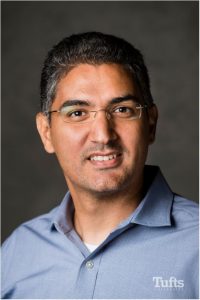Khaled ElMahgoub received B.Sc. and M.Sc. degrees in electronics and electrical communications engineering from Cairo University, Egypt, in 2001 and 2006, respectively. He received his Ph.D. in electrical engineering from the University of Mississippi, USA, 2010, an M.Sc. in Computer Science from Georgia Institute of Technology, USA, 2020, and an MBA from Boston University, USA, 2022. From 2001–2006, he was a teaching and research assistant at Cairo University. From 2007–2010, he was a teaching and research assistant at the University of Mississippi. He is an Associate Teaching Professor in the Electrical and Computer Engineering Department at Tufts University and the head of software quality at Philips. Previously, he was a senior Radar Verification and Validation manager at Autoliv. ElMahgoub worked as Validation Engineering Manager at Trimble Navigation, testing and developing RFID and IoT systems and applications.
Moreover, he was a research affiliate with the Auto-ID Labs at MIT. He co-authored over 45 technical journals and conference papers throughout his academic years. He is the primary co-author of two books entitled “Enhancements to Low-Density Parity Check Codes: Application to the WiMAX System,” 2010 and “Scattering Analysis of Periodic Structures Using Finite-Difference Time-Domain Method,” 2012. ElMahgoub was assistant editor for the Applied Computational Electromagnetic Society (ACES) Journal. He is also a frequent reviewer for many scientific journals, conferences, and books and has chaired technical sessions at international conferences. ElMahgoub is a senior member of IEEE, a member of ACES, and Phi Kappa Phi honor society. ElMahgoub is listed in Who’s Who in Science and Engineering. He received the ACES Early Career Award 2014, and the University of Mississippi scholarship for a Ph.D. Degree, University of Mississippi graduate school summer assistantship and Mobinil Scholarship for Master’s Degree. His current research interests include SW Engineering, Embedded Systems, RFID systems, Sensors, IoT, channel coding, FDTD, antenna design, and numerical techniques for electromagnetics.
